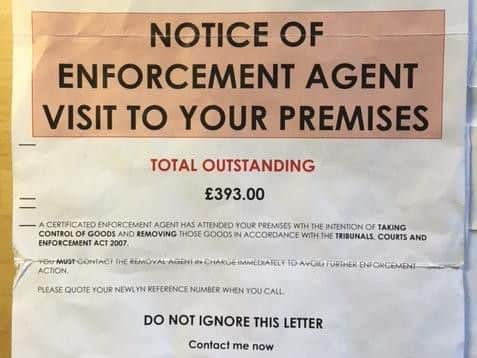SPECIAL REPORT: Amidst cuts and rent arrear debts, bailiffs in Northampton must be a last resort


But when taxes need collecting, councils call bailiffs.
Debt enforcement agencies were used over 11,000 times in Northampton in 2017, and over 9,000 of those were for rent arrears.
Agents are tasked with negotiating with residents who owe money and collect on debts. And Northamptonshire County Council’s financial malaise could see more people than ever fall into debt over their rent. Now the Citizens Advice Bureau (CAB)says it is time for Northampton Borough Council to commit to their residents that they will act responsibly through their bailiffs before the situation gets worse.
Advertisement
Hide AdAdvertisement
Hide Ad

“Bailiffs only make things worse”, says Martin Lord, chief executive of the Northampton branch of the CAB. “It might make a good short-term solution but it sends the resident into a downward spiral.
“The stress and anxiety of having someone demand money can push people into making decisions that make matters worse, and the costs that bailiffs collect for themselves just deepens that person’s debt problem.”
Although council tax is set by the police and individual local authorities, in Northampton it is up to the Guildhall to collect their share.
Councillor Brandon Eldred, cabinet member for finance at Northampton Borough Council, said: “The council is committed to working with customers to agree affordable payment plans, where they are struggling to pay a debt.
Advertisement
Hide AdAdvertisement
Hide Ad

“We work closely with the voluntary sector, who provide independent debt advice, and only use bailiffs as a last resort.
“We also meet with CAB representatives on a quarterly basis to discuss any concerns and respond appropriately.”
But the CAB’s concern is the borough council aren’t using bailiffs as a last resort.
Mr Lord said: “More and more people are in financial difficulty. Flat wage growth, uncertainty and welfare reform has increased personal debt across the country, and this is well documented.
Advertisement
Hide AdAdvertisement
Hide Ad

“The indication is that councils are experiencing more significant council tax arrears.”
In respect of that, Citizen’s Advice has produced the Council Tax Protocol. CAB branches are asking councils to sign up to the protocol, a good practice guide for when and how to employ bailiffs.
It commits councils to working with debt advice agencies and encourage early intervention so people struggling with debts can set up reasonable payments and alleviate stress. Crucially, it sets out bailiff action as a last resort, and even offers 28 days of ‘breathing space’ if debtors are seeking debt advice.
But Northampton is yet to sign up.


Mr Lord said: “We’ve made approaches to officers and councillors, but so far nothing has come of it.
Advertisement
Hide AdAdvertisement
Hide Ad“What is frustrating is if they’re not prepared to sign this, then it implies they believe they are already using bailiffs responsibly. Well, we’re not convinced that is the case 100 per cent of the time.”
Mr Lord says he has written to the borough council several times in the 2017, but never had a reply.
A Northampton Borough Council spokesperson said: “We continue to review our processes around council tax recovery and the use of enforcement agents and we are mindful of the processes set out in the Citizens Advice council tax protocol.
"We also meet with CAB representatives on a quarterly basis to discuss any concerns and respond appropriately."
Advertisement
Hide AdAdvertisement
Hide AdAlthough the council has reportedly cut its use of bailiffs by 29 per cent in the past two years, the tremors from the ongoing cuts at Northamptonshire County Council means this is surely set to rise.


After years of sticking to “the lowest council tax in the country”, the county council is set to bump it up by 3.98 per cent. If so many people in 2017 were struggling with rent arrears when the tax was low, how will they and other residents manage when it jumps up? And will the borough council see more cause for “last resort” bailiff action?
Mr Lord said: “The best way of reassuring us and their consumers would be to sign the protocol. It would be a powerful commitment to people who are in council tax arrears.
“If the CAB sees the same thing happening again and again, and it can be solved with a small policy change, that’s where we feel we need to take action.”
Advertisement
Hide AdAdvertisement
Hide AdCASE STUDY: How bailiffs came knocking at one Northampton man's door over a fine for a 60p parking ticket.
One Northampton man describes the bailiff action he received as “bullying and threatening” after earning a parking fine over a 60p ticket.
“I started receiving these letters telling me in big red letters ‘you need to pay us now’,” said the town-centre resident, who asked not to be named. “I don’t think I deserved the fine but the longer it dragged out the more and more expensive it got.
“They didn’t have my phone number at first. But I called the number on the letter to ask what was going on. After that, they kept texting and calling demanding payment.
Advertisement
Hide AdAdvertisement
Hide Ad“I was very stressed and felt threatened. I ended up paying £700 just to put an end to it.”
Martin Lord, for Citizens Advice Bureau Northamptonshire, said: “The official advice for nonconstructive bailiffs who are negotiating is to deny entry.
“Bailiffs visiting your home can be a stressful experience but you have rights and you shouldn’t be bullied. You shouldn’t let a bailiff into your home. Keep them outside and speak through the door or over the phone.
“Bailiffs are allowed to come in through unlocked doors. Lock them.
“Always get proof of who they are.”
Advertisement
Hide AdAdvertisement
Hide AdQ&A: The Chron asks the CEO behind the Stop The Knock campaign to reduce bailiff action.
Why do we need to see less bailiff action in the UK?Bailiff action can seriously harm the wellbeing of residents who are often already in vulnerable situations. It can also deepen debt problems through additional fees and charges.We understand the enormous financial pressures on councils, and they, of course, need to recover what they are owed to fund vital services. However, our research shows a growing use of bailiffs by local authorities with council referring 2.3million debts in 2016/17, an increase of 14 per cent in two years.
What are the alternatives to bailiff action?Bailiff action should only ever be used as a last resort, and can be avoided by early intervention, making sure residents get the free debt advice they need and agreeing to repayment arrangements that are affordable and sustainable.
Is Northampton working to use bailiffs less?The good news is that many councils are working hard to improve. Nearly four in 10 are actually using bailiffs less than they were two years ago, including Northampton Borough Council who have reduced their use by 29 per cent.We look forward to further engaging with councils in the coming months on ways to improve practice.